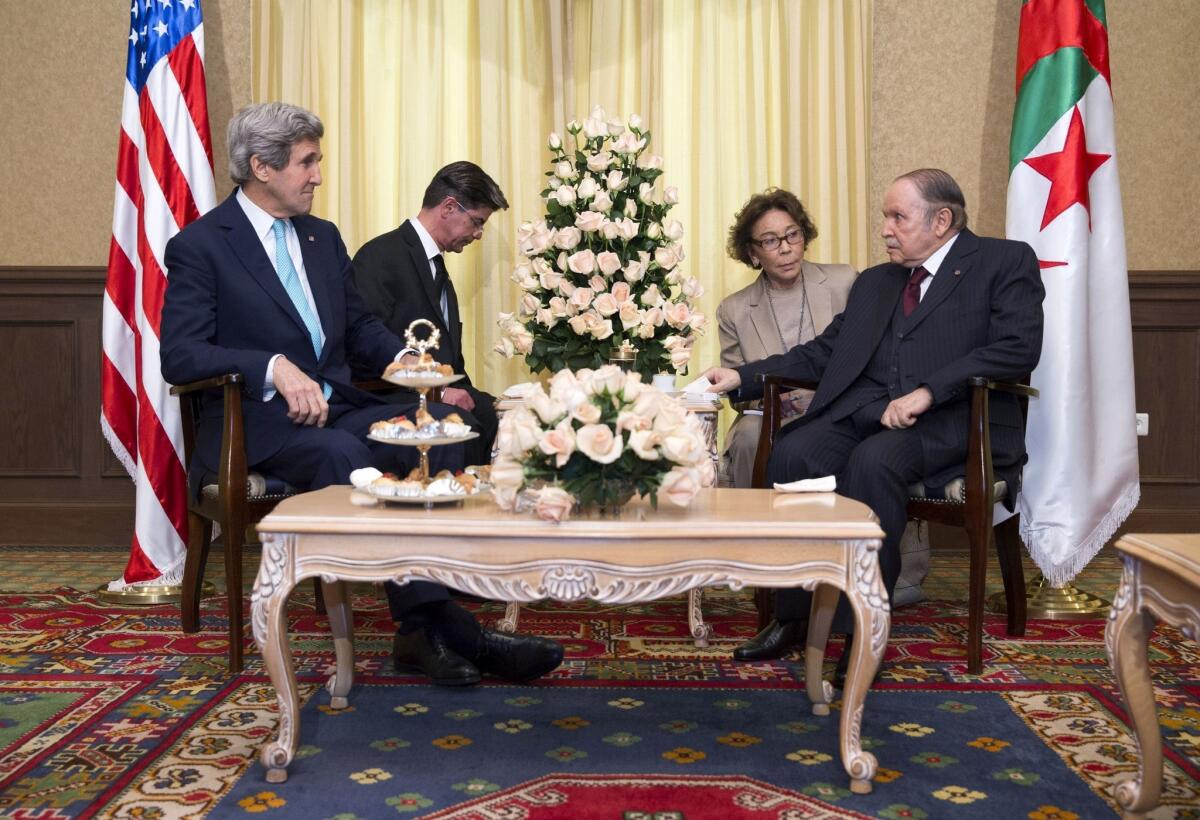Israel shelves prisoner release as Mideast talks stall

JERUSALEM — Mideast peace talks remained in deep crisis Thursday as Israel froze plans to release Palestinian prisoners and officials threatened sanctions after the Palestinian Authority’s request to join multiple international conventions.
When U.S.-brokered peace talks were resumed in July, the Israeli government pledged to release 104 Palestinians serving long-term jail sentences in Israel for crimes committed before the 1993 Oslo accords. In return, the Palestinians committed to suspend for nine months their bid for wider recognition as a state.
But after three waves of prisoner releases, Israel delayed freeing the last group, hoping to link it to a plan to continue the negotiations past the end of April. Outraged by the delay and by an awkwardly timed bid to build more Israeli housing in Jerusalem, Palestinians moved to join more than a dozen international bodies.
Israel is now freezing the scheduled release until the Palestinians rescind the requests.
The impasse deepened into a crisis just as U.S. Secretary of State John F. Kerry was working on a three-way deal that would extend talks and allow the prisoner release. Kerry canceled his planned return to the region Wednesday and negotiating teams met with American mediator Martin Indyk overnight for a long session that local media described as particularly stormy.
Israel’s chief negotiator, Justice Minister Tzipi Livni, told her counterparts that Israel will not be able to go ahead with the release in light of the new circumstances created by the Palestinian move, and called on the Palestinian Authority to retract its applications.
Some Israeli officials threatened punitive measures. Deputy Foreign Minister Zeev Elkin told Israeli media Thursday that Israel has plenty of leverage it can employ to show the Palestinians that unilateralism “doesn’t pay off.” Among the possible measures, Elkin listed financial pressures, settlement construction and even partial annexation of West Bank areas.
The fourth and last release of prisoners was especially controversial because Palestinians expected it to include a group of Arab Israeli citizens. At the time, Israeli Prime Minister Benjamin Netanyahu had pledged to bring the highly sensitive issue before the Cabinet. It remains unclear whether he did.
The deal Kerry was trying to advance before the breakdown involved Israel releasing 400 more prisoners and implementing a partial settlement freeze, in return for Palestinians sticking with the talks and possibly for American consent to free convicted spy Jonathan Pollard.
Palestinians rejected the offer and it is not clear whether it is still on the table.
On Thursday evening, the Palestinians reportedly compiled a new list of conditions for extending the peace talks past the April deadline. Among other things, they want Netanyahu to commit in writing to a Palestinian state along the 1967 borders and with East Jerusalem as its capital, as well as the release of 1,200 prisoners and an end to the blockade on the Gaza Strip.
In interviews Thursday, each side insisted that the other should make the next move, while Kerry, in Algeria, implored both to “lead.”
Emphasizing the U.S. commitment to the process, Kerry said that it can facilitate, push and nudge, but “the parties themselves have to make fundamental decisions … the leaders have to lead.”
Quoting the adage “You can lead a horse to water but you can’t make it drink,” Kerry said, “Now’s the time to drink, and the leaders need to know that.”
Kerry spoke Thursday at the opening of the U.S.-Algeria Strategic Dialogue talks in Algeria.
Despite reports that he was close to giving up, Kerry spoke with both Netanyahu and Palestinian Authority President Mahmoud Abbas about trying to resolve the crisis.
More to Read
Start your day right
Sign up for Essential California for news, features and recommendations from the L.A. Times and beyond in your inbox six days a week.
You may occasionally receive promotional content from the Los Angeles Times.






